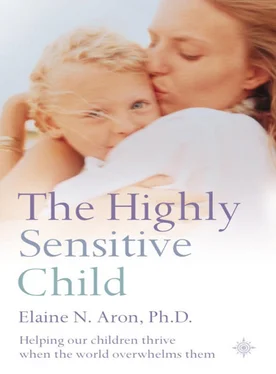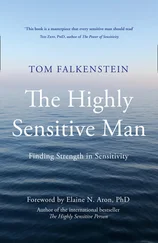Although HSCs notice more, they do not necessarily have better eyes, ears, sense of smell, or taste buds—although some do report having at least one sense that is very keen. Mainly, their brains process information more thoroughly. This processing is not just in the brain, however, since highly sensitive people, children or adults, have faster reflexes (a reaction usually from the spinal cord); are more affected by pain, medications, and stimulants; and have more reactive immune systems and more allergies. In a sense, their entire body is designed to detect and understand more precisely whatever comes in.
When I was little my father liked to take our family to visit factories, where he would talk the managers into taking us on a tour. The steel mills and glass manufacturers overwhelmed me, of course, because I was highly sensitive. They were too loud, hot, and fiery, and I would cry, so that I dreaded these trips. My nonsensitive family members, on the other hand, were annoyed by my tour-stopping behaviors. But I liked one tour—the orange-packing plant. I liked the ingenious invention that moved the oranges down a shaking conveyer belt until they fell into one of three sized slots—small, medium, or large.
I now use that experience as a way to describe the brains of HSCs. Instead of having three slots for processing what comes down the conveyer belt to them, they have fifteen slots, for making very fine distinctions. And all goes well until too many oranges come down the belt at once. Then you have a huge jam up.
So of course HSCs probably will not like the loud mariachi band in the Mexican restaurant, noisy birthday parties, playing fast-paced team sports, or everyone watching while they give an answer in class. But if you need a guitar tuned, a clever idea for party favors, a witty play on words, or to win a game like chess that requires anticipating consequences or noticing subtle differences, your HSC is the one to have around.
Can your child be just a little sensitive? Some researchers say you either have the trait or you do not; others say it is a continuum. My own research says both—that is, some HSCs seem more sensitive than others, probably because there are so many ways that a child’s environment can increase or decrease how much sensitivity is expressed. But if it were a true continuum, like height or weight, most people would be in the middle. In fact, the distribution of highly sensitive people is more like a flat line, perhaps even with a few more people at either end.
Inside the Highly Sensitive Child
Let’s go farther inside the mind of your HSC. Yes, he notices more, but he may have a “specialty.” Some tune in to social cues, mainly noticing moods, expressions, or relationships. Some HSCs mainly notice the natural world, such as changes in the weather or the qualities of plants, or they seem to have an uncanny ability to communicate with animals. Some express subtle concepts, or the humorous and ironic. And some are mainly vigilant in new surroundings while others are mainly bothered by a change in the familiar. Still, in all cases, they are noticing more.
Your HSC is also thinking more than other kids about what she has noticed. Again, there is always variation. She may be pondering and asking you questions about social dilemmas—why you did what you did, why one kid teased another—or larger social issues. Another HSC might be trying to solve difficult math or logic puzzles, or worrying about “what would happen if,” or making up stories or imagining their cat’s thoughts. All kids do these things, but HSCs do them more.
The HSCs’ reflecting on “what’s come in,” particularly whatever they have seen or heard, may be quite conscious and obvious, as when they ask for more time to decide something. (You have probably noticed that trying to get an HSC to decide quickly is like trying to walk a male dog quickly past fire hydrants.) But often HSCs’ processing is entirely unconscious, as when they just intuitively sense what is going on with you. Indeed, intuition might be defined as knowing something without knowing how you know it, and sensitive people are generally highly intuitive.
The processing may be rapid, as when a child instantly knows “something’s up” or “you changed my sheets” when other children would not notice. Or it may be slow, as when HSCs think about something for hours, then announce some startling insight.
Finally, as a result of taking in more and processing it more completely, if the situation is creating an emotional response (and all situations do to some extent), your HSC is going to feel stronger emotions. Sometimes it’s intense love, awe, or joy. But because all children are dealing with new, stressful situations every day, HSCs will also have to feel fear, anger, and sadness, and feel these more intensely than other children.
Because of these strong feelings and deep thoughts, most HSCs are unusually empathic. So they suffer more when others suffer and become interested early in social justice. They are also brilliant interpreters of what is happening in anything or anyone that cannot speak—plants, animals, organs in bodies, babies, those not speaking the sensitive person’s language, and the very elderly when they suffer from dementia. They tend to have rich inner lives. And again, HSCs are conscientious for their age—they can imagine for themselves or understand when you say “what if everybody did that.” They also tend to seek the meaning of their lives very early.
Mind you, HSCs are not saints. In particular, with a few bad experiences, they are more likely than others to become shy, fearful, or depressed. But with a little gentle guidance, they are exceptionally creative, cooperative, and kind—except when overwhelmed. And whatever they are doing—or not doing—HSCs do stand out, even though they are not “problems” in the usual sense.
Long before I knew I was raising a highly sensitive child, I just knew my son was “different.” He was aware, incredibly creative, conscientious, cautious in new situations, easily hurt by his peers, not fond of “rough and tumble” play or sports, and emotionally intense. He was hard to raise in some ways, easy in others, and always stood out, even if only as the kid who was not joining in. So I developed the motto that I shared with you in the Introduction: If you want to have an exceptional child, you must be willing to have an exceptional child .
The Problem of Becoming Easily Overstimulated
Although I could sing the praises of HSCs for many pages, you are reading this book because you need help. Unfortunately, most people—and that includes parents—tend to notice mostly the down side of sensitivity. This is, again, because HSCs are easily bothered by things other children do not notice, and can become totally overwhelmed by a noisy, complex, constantly changing situation, like a classroom or a family reunion, especially if they are in that environment for too long. How could they not be bothered, when they sense so much in every situation? But given the fact that HSCs are in the minority, their reactions and solutions often seem odd to others. Hence all those hints from others, or perhaps suspicions in your own mind, that your child is abnormal.
What are some of the ways in which HSCs try to deal with overstimulation? No child will do all of these, but some will likely be familiar to you. Often HSCs complain a great deal—it’s too hot, too cold, the fabric is too itchy, the food is too spicy, the room smells too weird—things other children would not even notice. And they may choose to play alone, watch quietly from the sidelines, eat only familiar foods, or stay in one room or indoors or in a certain spot outside. They may refuse for a few minutes, hours, days, or even months to speak to adults, strangers, or in class. Or they may avoid “typical, fun kid activities” like summer camp, soccer, parties, or dating.
Читать дальше











